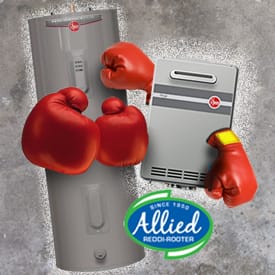Thursday, March 9th, 2017
Tankless Water Heaters – A 101 Overview

Two years ago, we wrote a blog on tank vs. tankless water heaters – the local adoption rate of tankless was low at the time. Since then, the numbers of installations has risen slowly. Seemingly, Cincinnatians like the tradition of a tank water heater. Changing an American paradigm is tough.
What is a Tankless Water Heater?
According to the Department of Energy, “Tankless water heaters, also known as demand-type or instant water heaters, provide hot water only as it is needed.” They are considered to be more efficient than traditional tank water heaters because “they don’t produce the standby energy losses associated with storage water heaters.”
How Do Tankless Waters Work?
When a hot water is turned on, cold water is piped directly in to the tankless water heating unit. There, the cold water is heated (with either an electric element or a gas burner, depending on you situation). The “instant heating” function enables the homeowner to receive a constant supply of hot water.
Can a Tankless Heater Provide a Steady Flow of Hot Water?
It depends. As a rule, gas-operated tankless units have a higher flow rate than electric versions. Generally speaking, however, tankless water heaters provide hot water at a rate of 2–5 gallons per minute.
The Department of Energy notes that “sometimes, even the largest, gas-fired model cannot supply enough hot water for simultaneous, multiple uses in large households. For example, taking a shower and running the dishwasher at the same time can stretch a tankless water heater to its limit. To overcome this problem, you can install two or more tankless water heaters, connected in parallel for simultaneous demands of hot water. You can also install separate tankless water heaters for appliances — such as a clothes washer or dishwater — that use a lot of hot water in your home.”
Is There More Than One Way to Use A Tankless Water Heater?
Good question! Yes, using a tankless/on-demand water heater as a ‘booster’ water heater is increasingly popular. Common uses include:
· Remote bathrooms (e.g., in the man-cave) or hot tubs
· Booster for hot water-using appliances
· Booster for a solar water heating system
How Do I Know if I Need A Tankless Water Heater?
If your daily hot water usage is less than 45 gallons of hot water daily, a tankless water heater can be as much as 34% more energy efficient than a tank water heater.
If your daily hot water usage is more than 45 gallons a day (that is any household with 1or more teenagers), the efficiency rate for tankless heaters is significantly lower. To compensate, install multiple tankless heaters (one for each hot water application
Are Tankless Water Heaters Expensive To Install & Run?
Although the initial cost of a tankless water heater may be higher, they may also have a longer life span – upwards of 20 years (vs. 8-15 for a tank model). Also, the reduced energy costs associated with tankless heaters helps reduce the overall cost.
Operational costs vary – refer to the manufacturer’s information for details
Water You Waiting For? If your water heater is getting on in years and you’d like to free up some space in your utility area, tankless may be an option worth looking into (especially if you are replacing a gas water heater). Call Ray to learn his thoughts on the tank-vs-tankless conversation. (513) 396-5300, or Contact us. We always come highly recommended and have earned an A+ rating from the Better Business Bureau for our expert quality of service.
